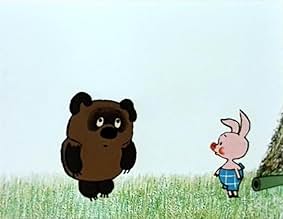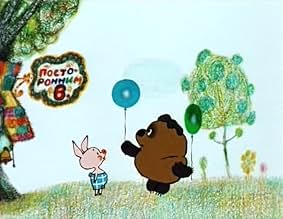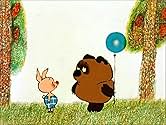IMDb RATING
8.2/10
5.3K
YOUR RATING
A Soviet version of Winnie-the-Pooh. His first adventure is a desperate attempt to get to honey in a bee hollow. He is ready to take decisive action.A Soviet version of Winnie-the-Pooh. His first adventure is a desperate attempt to get to honey in a bee hollow. He is ready to take decisive action.A Soviet version of Winnie-the-Pooh. His first adventure is a desperate attempt to get to honey in a bee hollow. He is ready to take decisive action.
- Director
- Writers
- Stars
Evgeniy Leonov
- Vinni-Pukh
- (voice)
- (as E. Leonov)
Iya Savvina
- Pyatachok
- (voice)
- (as I. Savvina)
Vladimir Osenev
- Narrator
- (voice)
- (as V. Osenev)
- Director
- Writers
- All cast & crew
- Production, box office & more at IMDbPro
8.25.2K
1
2
3
4
5
6
7
8
9
10
Featured reviews
"This buzz is not without a reason"
Animators in the Soviet Union never really cared about copyright. Their work was typically destined to be released only in their own country, and so there seemed little reason to bother with gaining permission from the likes of Dr. Seuss {as in Alexei Karaev's 'Welcome (1966)'} or A.A. Milne. Fyodor Khitruk's series of animated Winnie the Pooh adaptations was not the first, Wolfgang Reitherman at Disney having already directed two shorts several years earlier, but they are nonetheless well-remembered by Russians who grew up watching the cartoons on television. With a cheeky, down-to-earth charm that appeals to both children and adults, the series beginning with 'Vinnie-Pukh (1969)' has since developed something of a cult following, and are considered by many to decisively surpass their Disney counterparts, however uneasily they may fit into the official canon. The animation itself is somewhat coarse and minimalistic, but this all adds to the charm of it all, with the story and characters coming to life as though they have just stepped out of a picture-book.
The first film runs just 11 minutes in length, and follows the efforts of Winnie and Piglet to steal precious honey from a hive of fiercely territorial bees. Demonstrating a keen sense of creativity, Winnie decides to borrow a blue balloon from Piglet's home, the idea being that, after the balloon carries him to the top of the oak tree, the bees will mistake the balloon for a piece of sky, and Winnie for a darkened rain cloud. It was a good idea in theory. One doesn't usually associate Winnie the Pooh with intelligence, but the Russian version does exhibit a sharp sense of wit, and Evgeni Leonov brings a wonderful amount of humour and character to his voice-acting. Piglet (or Pyatachok, voiced by actress Iya Savvina) is placed cute and innocent, enthusiastically submitting to Winnie's every command, and occasionally lamenting at the loss of his beloved blue balloon. For fans of Soviet animation, or animation in general, 'Vinnie-Pukh' is a charming and witty moving storybook.
The first film runs just 11 minutes in length, and follows the efforts of Winnie and Piglet to steal precious honey from a hive of fiercely territorial bees. Demonstrating a keen sense of creativity, Winnie decides to borrow a blue balloon from Piglet's home, the idea being that, after the balloon carries him to the top of the oak tree, the bees will mistake the balloon for a piece of sky, and Winnie for a darkened rain cloud. It was a good idea in theory. One doesn't usually associate Winnie the Pooh with intelligence, but the Russian version does exhibit a sharp sense of wit, and Evgeni Leonov brings a wonderful amount of humour and character to his voice-acting. Piglet (or Pyatachok, voiced by actress Iya Savvina) is placed cute and innocent, enthusiastically submitting to Winnie's every command, and occasionally lamenting at the loss of his beloved blue balloon. For fans of Soviet animation, or animation in general, 'Vinnie-Pukh' is a charming and witty moving storybook.
Best Milne adaptation ever
I don't mean to generalize, but if you really want to get some sense of the difference between Russian and American animation (with many many exceptions, obviously), just compare this phenomenal Vinni Pukh with the wretched Disney Winnie the Pooh. The Disney one is sentimental, pandering, unsophisticated, and dumb. Winnie himself lethargically stumbles along like a middle-aged man with a developmental disability. Vinni, however, is vigorous, adventurous, and witty. He's sly and he has attitude. He is no longer a disposable "silly old bear," he is a worthy protagonist. Pyatachok is not a pathetic, feathery-voiced ball of pink. He is vibrant and fun, and their friendship, so beautifully rendered by Milne and made sappy and idiotic by Disney, is here authentic and moving once again. Soviet animation at its best.
One of the best!
Vinni Pukh is one of the best soviet cartoons. There are actually very few good soviet cartoons and this is one of them. Vinni Pukh is a beautifully drawn cartoon with its own unique atmosphere, good characters, beautiful music and entertaining story. Vinni Pukh himself is an amazing character, he is cute and beautifully looking. He also is very creative and fun person. The cartoons third episode though contains dramatic segements releated to a newly introduced character which i did not like. Overall the cartoon is very good and absolutely worth watching especially as it is fairly short. One of the controverses though is Pitachok's look as he doesnt look like an actual pig and his eyes are also weird. So there are one-two few "flaws" and thats it for this cartoon. And yeah this cartoon surely beats the american version. Just go ahead and watch it especially if youre russian speaking.
Dear Disney: you know nothing when it comes to adapting A.A. Milne's works.
Unless you've read any of A.A. Milne's original works, then your image of Winnie the Pooh is the treacly cartoons released by Disney. But there was another set of cartoons depicting the honey-obsessed bear. This set got produced by Soyuzmultfilm, a studio in the Soviet Union, and their Pooh looks more ursine than the Disney one. The first one was "Vinni-Pukh" (the Russian pronunciation of the bear's name). In this one, Pooh wants to get some honey out of a beehive, and so he enlists Piglet's help (Piglet is called Pyatachok in Russian). Naturally there are a few snags. I particularly liked Pooh's nonsense singing. This particular cartoon doesn't include the rest of the characters. It's all about Pooh, Piglet, and the bees. Anyone interested in the history of animation can't afford to miss this short.
I like its style
As much as I like the Disney version I like this version too. I like its style because it's unique. The animation has this child-like feel which really works. It looks like a kid created this whole world in school and I mean that in a good way. The characters are enjoyable to watch too. I notice they have more of a cynical yet energetic edge which I find interesting. One thing I find weird is how Christopher Robin's absent. The reason being director Fyodor Khitruk removed him because he wanted the characters to be equal and in his eyes Robin was superior to the rest. I don't know about that. Even so this's an enjoyable cartoon that captures the essence of the books and I highly recommend it.
Fun Fact: When director Fyodor Khitruk visited Disney studios the director of Pooh and the Blustery Day, Wolfgang Reitherman, told him that he liked his version better.
Fun Fact: When director Fyodor Khitruk visited Disney studios the director of Pooh and the Blustery Day, Wolfgang Reitherman, told him that he liked his version better.
Did you know
- TriviaWhen "Winnie the Pooh and the Blustery Day" (1968) won best short film at the Academy Awards in 1969, Wolfgang Reitherman told Fyodor Khitruk that, despite winning, he preferred the Soviet Union version.
- Quotes
Vinni-Pukh: Why do bees exist?
- ConnectionsFeatured in What? Where? When?: The Sixth Game (1982)
Details
- Release date
- Country of origin
- Language
- Also known as
- Winnie Pooh
- Production company
- See more company credits at IMDbPro
Contribute to this page
Suggest an edit or add missing content



























